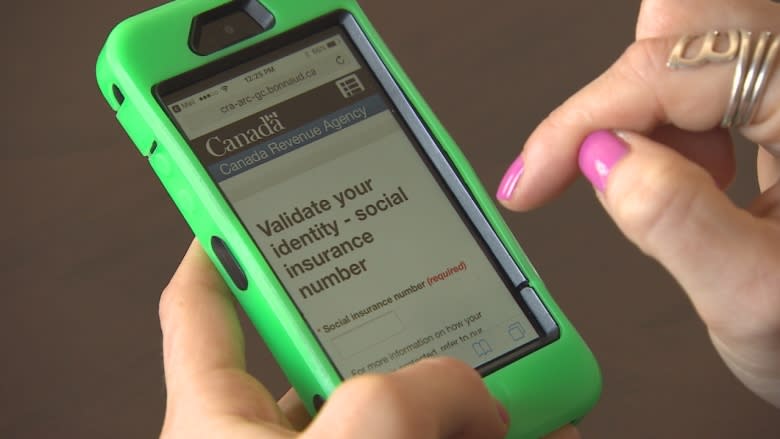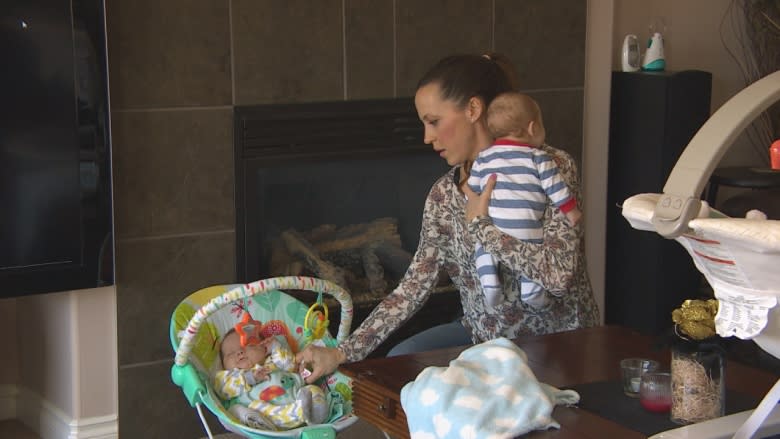Mom of twins sees double after online tax scam copies government site
A Winnipeg woman is warning others about an online tax scam that tricked her into handing over her social insurance number before she realized it was a fake site.
Whitney Jones says she got an email last week from what she thought was the Canada Revenue Agency. The email said she was owed $458 from her 2015 tax return.
"It was one of those things where you're just so busy you just kind of quickly go through it and you're [thinking] this looks OK, this looks legit," said Jones, who is at home on maternity leave after having twin boys in December.
She was instructed to click on a link in order to access her refund. She was then asked to provide her social insurance number in order to continue, which she did.
"Then it went through first name, last name, address, telephone number," said Jones.
"Then it asked for my driver's licence number, my mother's maiden name and then at the very last section, asked me for my banking and credit card information," she said.
That's when Jones knew something wasn't right. She checked the CRA website and realized she was seeing double.
"They were identical," said Jones. "The fonts, the colours, the logo, everything was identical."
Jones says she still didn't feel right about being asked to provide so much information online, but she had made some adjustments to her 2015 return, and the amount was strikingly similar to what she had already received. She thought this could be a further adjustment to the $450 she got back.
"I said to myself, I'm going to hate myself if this is a scam, but if it's not a scam I could really use $458 right now," said Jones.
She decided to call CRA and wait on hold to speak to a representative.
"Immediately they said, 'That's a scam,'" said Jones.
"[They] basically said, delete the email, tell everybody you know that this is just a professional who made a professional site," she said.
Scams on the rise
The Canada Revenue Agency says they never ask taxpayers to provide their personal or financial information by email, text message or by clicking on a link.
They say an email notification may be sent if a taxpayer subscribes to that service, but would never include any information about a refund amount or an amount owed.
Taxpayers can only access that information by logging into their secure account with CRA.
The CRA also says it has seen an increase in scams that attempt to get personal information using emails, text messages, phone calls and regular mail that claim to be from CRA.
"These fraudulent communications typically insist that this personal information is needed so that the taxpayer can receive a refund or benefit payment," said a spokesperson for the CRA in an email.
"These are scams and taxpayers should never respond to these fraudulent communications or click on any of the links provided," they said.
Anyone can be at risk
Jones says she's glad she didn't provide any additional personal information, but admits she should not have handed over her social insurance number so easily.
"I do all my banking online. I do everything online and I know it does put me at a risk," said Jones.
"I'm also cautious when I'm doing things [online]. This did catch me a little bit because of how similar it did look to the real website," she said.
Jones has also been on maternity leave and recently used several government websites sites to access benefits and register the births of her twin boys, born Christmas Day.
She says she's had to provide so much personal information online recently she became accustomed to handing it over.
"I've given out my SIN number and my address and my personal information so many times, so many forms, in the last couple months with everything that's happened in my life personally, that it just seemed like another one," she said.
Jones says she wanted to warn others because she considers herself to be very savvy online and wants others to know that they can be vulnerable too.
"I have to be on it and I have to be careful and I have to go with my gut and know that I am susceptible to this sometimes," she said.
The CRA website has information on how people can protect themselves and advises anyone who has provided information and/or money to scam artists to contact the Canadian Anti-Fraud Centre (CAFC), their local police authorities and their financial institutions.





